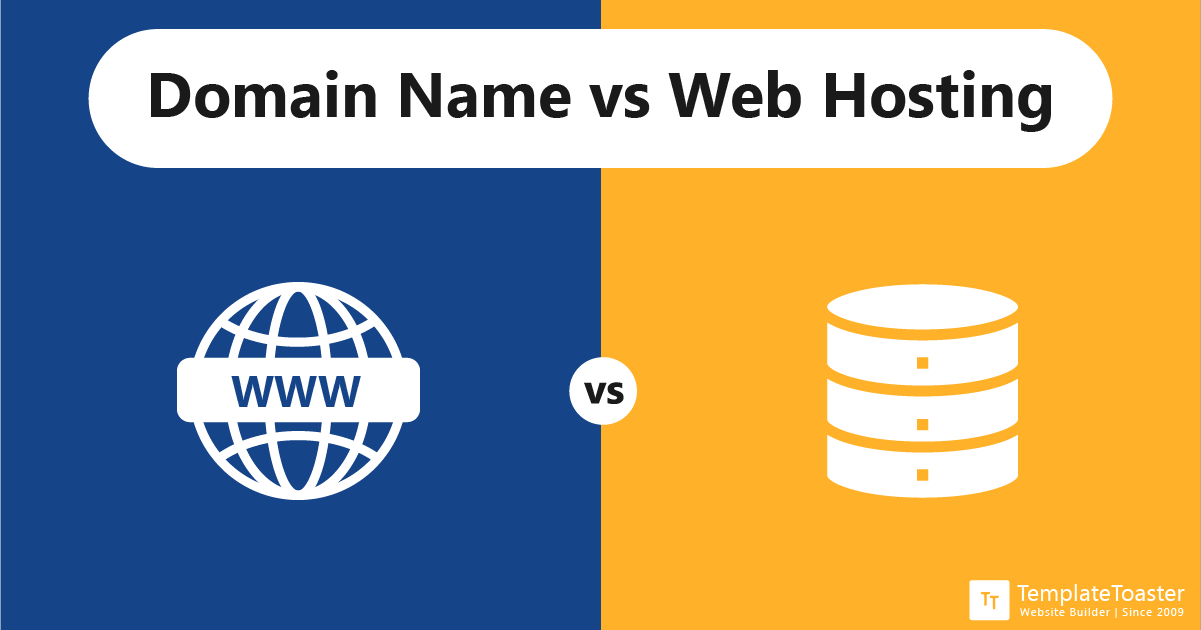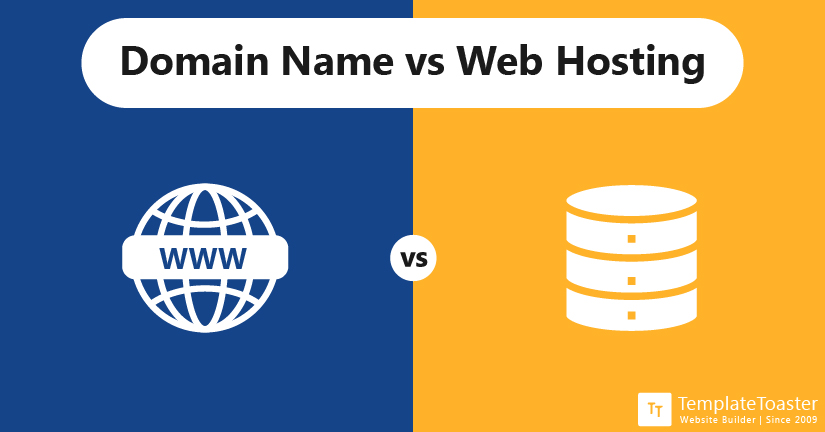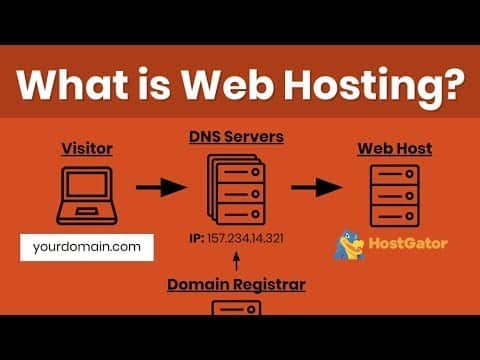Choosing between web hosting and a domain name can be confusing. Both are essential for your website.
But they serve different purposes. Web hosting and domain names are often misunderstood. They are not the same thing, yet both are crucial. Web hosting provides the space for your website on the internet. A domain name is your website’s address.
It helps users find your site. Understanding the difference is key. This knowledge ensures you make the right decisions. Choosing the right services will help your website succeed. Let’s explore these concepts further. We’ll highlight their differences and importance. This will help you make informed decisions for your online presence.
What Is Web Hosting?
Web hosting is a service that allows individuals and businesses to make their websites accessible on the internet. Think of it as renting space on a server where your website’s files are stored. This server is connected to the internet, enabling users to visit your site from anywhere in the world.
Types Of Web Hosting
There are various types of web hosting services, each catering to different needs. Here are the most common ones:
- Shared Hosting: Multiple websites share the same server resources, making it affordable.
- Virtual Private Server (VPS) Hosting: Offers more control and resources than shared hosting by dividing a server into virtual servers.
- Dedicated Hosting: Provides an entire server dedicated to one website, offering maximum control and resources.
- Cloud Hosting: Uses a network of servers to ensure reliability and scalability.
- Managed Hosting: The hosting provider manages the server, including maintenance and updates.
How Web Hosting Works
Web hosting works by storing your website’s files on a server. When someone types your domain name into a browser, the browser requests the files from the server. The server then sends the files back to the browser, which displays your website.
Here’s a simple breakdown:
- You purchase a web hosting plan and a domain name.
- You upload your website files to the web host’s server.
- When users enter your domain name, their browser requests your site from the server.
- The server responds by sending the website files to the user’s browser.
- The browser displays your website to the user.
Choosing the right type of web hosting is crucial for your website’s performance and user experience. Consider your needs and budget to find the best fit.

Credit: blog.templatetoaster.com
What Is A Domain Name?
A domain name serves as your website’s address on the internet. It is different from web hosting, which provides the space to store your website’s files. Both are essential for making your site accessible online.
A domain name is your website’s address on the internet. It’s how people find your site. Think of it as your home address, but online. Without a domain name, you wouldn’t be able to access websites.Structure Of A Domain Name
A domain name has three parts. First, the subdomain. Second, the second-level domain. Third, the top-level domain. Let’s break it down. The subdomain is the www part. The second-level domain is your unique name, like “example”. The top-level domain is the .com, .net, or .org part. Together, they form the full domain name, like www.example.com.How Domain Names Work
When you type a domain name, your browser looks for the IP address. The IP address is like a phone number for the website. This process involves the Domain Name System (DNS). The DNS translates the domain name to an IP address. Next, your browser connects to the web server at that IP address. It then loads the website. This process happens in seconds. It makes finding websites easy and quick. Understanding domain names helps you create a strong online presence. It’s a key part of web hosting. “`Key Differences
Choosing between web hosting and a domain name can be confusing. Both are essential for a website, but they serve different purposes. Understanding their key differences helps in making an informed decision.
Functionality
Web hosting provides the space where your website files are stored. Think of it as renting a house where your website lives. Your website’s content, images, and databases are all housed here. Without web hosting, your website cannot be accessed on the internet.
Domain name is the address people use to find your website. It’s like the address of your house. The domain name directs users to your web hosting server. Without a domain name, users cannot find your website easily.
| Aspect | Web Hosting | Domain Name |
|---|---|---|
| Purpose | Stores website files | Website address |
| Requirement | Essential for website presence | Essential for website navigation |
Cost Implications
Costs for web hosting vary based on the type and features. Shared hosting is cheaper, while dedicated hosting is more expensive. Prices range from a few dollars to hundreds monthly.
Costs for a domain name are generally lower. Most domains cost around $10 to $20 annually. Premium domain names can be more expensive, depending on demand and uniqueness.
- Web hosting: $3 – $300/month
- Domain name: $10 – $20/year
Both web hosting and domain names are necessary for a functional website. Their costs and functionalities differ, making them distinct yet complementary components.
Credit: thedesignspace.co
Choosing Web Hosting
Choosing the right web hosting is crucial for your website’s success. The right host ensures your site runs smoothly and remains accessible to users. There are several factors to consider before making a decision.
Factors To Consider
When selecting a web hosting provider, keep these factors in mind:
- Uptime: Reliable uptime guarantees your site stays online. Look for hosts with at least 99.9% uptime.
- Speed: Fast loading times improve user experience. Check the host’s server speed.
- Customer Support: 24/7 support is essential. Ensure the host offers multiple support channels.
- Scalability: Your hosting plan should grow with your business. Consider if the host offers easy upgrades.
- Security: Protect your site from threats. Look for features like SSL certificates and regular backups.
- Pricing: Compare prices and features. Balance cost with the services provided.
Popular Providers
Here are some popular web hosting providers to consider:
| Provider | Features | Price |
|---|---|---|
| Bluehost | Free domain, 24/7 support, 99.9% uptime | Starting at $2.95/month |
| SiteGround | Daily backups, excellent speed, top-notch support | Starting at $3.99/month |
| HostGator | Scalable plans, 24/7 support, free website builder | Starting at $2.75/month |
| A2 Hosting | Turbo servers, free SSL, anytime money-back guarantee | Starting at $2.99/month |
Each provider offers unique features to fit different needs. Consider your specific requirements before making a choice.
Choosing A Domain Name
Choosing a domain name is a crucial step in creating your online presence. Your domain name is your identity on the web. It’s how users find and remember you. This section will guide you through the best practices and popular registrars for selecting the perfect domain name.
Best Practices
- Keep it Short: A shorter domain name is easier to type and remember.
- Use Keywords: Include relevant keywords that describe your business or site.
- Avoid Numbers and Hyphens: These can confuse users and lead to typos.
- Choose a Memorable Name: Make sure it’s easy to pronounce and spell.
- Check for Trademarks: Ensure your domain doesn’t infringe on any trademarks.
Popular Registrars
Below is a list of some of the most popular domain name registrars:
| Registrar | Features |
|---|---|
| GoDaddy | Affordable, reliable, and user-friendly interface |
| Namecheap | Competitive pricing, free privacy protection |
| Bluehost | Free domain with hosting plans, excellent support |
| Google Domains | Transparent pricing, easy integration with Google services |
Integrating Web Hosting And Domain Names
Integrating web hosting and domain names is essential for any online presence. Your domain name is your website’s address. Your web hosting is the space where your website files are stored. Both are crucial for your website to be accessible on the internet.
Proper integration ensures that visitors can reach your site using your domain name. This process involves DNS configuration and managing multiple domains. Let’s dive into each aspect to understand how they work together.
Dns Configuration
DNS stands for Domain Name System. It translates your domain name into an IP address. This IP address directs users to your web hosting server. Configuring DNS settings correctly is vital. Incorrect settings can make your website unreachable.
To configure DNS, you must access your domain registrar’s control panel. Here, you will find options to update DNS records. Key records include A, CNAME, and MX records. Each type of record serves a different purpose. A records point to your website’s IP address. CNAME records alias one name to another. MX records handle email routing.
Managing Multiple Domains
Many businesses and individuals own multiple domains. Managing them efficiently is important. You can point multiple domains to the same web hosting account. This is useful for brand protection and marketing strategies.
To manage multiple domains, you need to add them to your hosting account. This process is called “domain parking” or “add-on domains.” Each hosting provider has a different method. Check their documentation for specific steps. Once added, configure DNS settings for each domain.
Some hosting plans offer unlimited domains. Others have limits. Choose a plan that fits your needs. Proper management ensures all domains function correctly and direct users to the right content.
Common Misconceptions
Understanding the difference between web hosting and a domain name can be tricky. Many people confuse the two, leading to common misconceptions. Let’s clear up these misunderstandings.
Web Hosting Vs. Domain Name
Web hosting and domain names are not the same. A domain name is your website’s address, like www.example.com. Web hosting is where your website lives. Think of it as renting space for your website on the internet. You need both to have a functioning website.
Shared Hosting Myths
Many believe shared hosting is not secure. This is false. Shared hosting can be secure with proper measures. Another myth is that shared hosting is always slow. While shared hosting can be slower, good providers manage resources well. This ensures good performance even on shared plans.
Some think shared hosting limits your website’s growth. This is also not true. Shared hosting can support growing websites. You can always upgrade as your needs change.

Credit: blog.templatetoaster.com
Frequently Asked Questions
What Is A Domain Name?
A domain name is the web address users type to access your website. It’s your online identity.
What Is Web Hosting?
Web hosting is the service that stores your website’s files on a server, making it accessible online.
Do I Need Both Web Hosting And A Domain Name?
Yes, you need both. The domain name is your website’s address, and hosting stores your website’s files.
Can I Buy Domain Name And Hosting Together?
Yes, many providers offer packages that include both domain name registration and web hosting services.
Conclusion
Choosing between web hosting and a domain name doesn’t have to be confusing. Web hosting stores your website files. A domain name is your website’s address. Both are crucial for a successful online presence. Think of web hosting as your website’s home.
The domain name is the street address. Understanding their differences helps in making informed decisions. Your website’s performance and accessibility depend on both. Make sure to pick reliable providers for both services. This ensures a smooth and efficient online experience.
Happy website building!



Leave a Reply